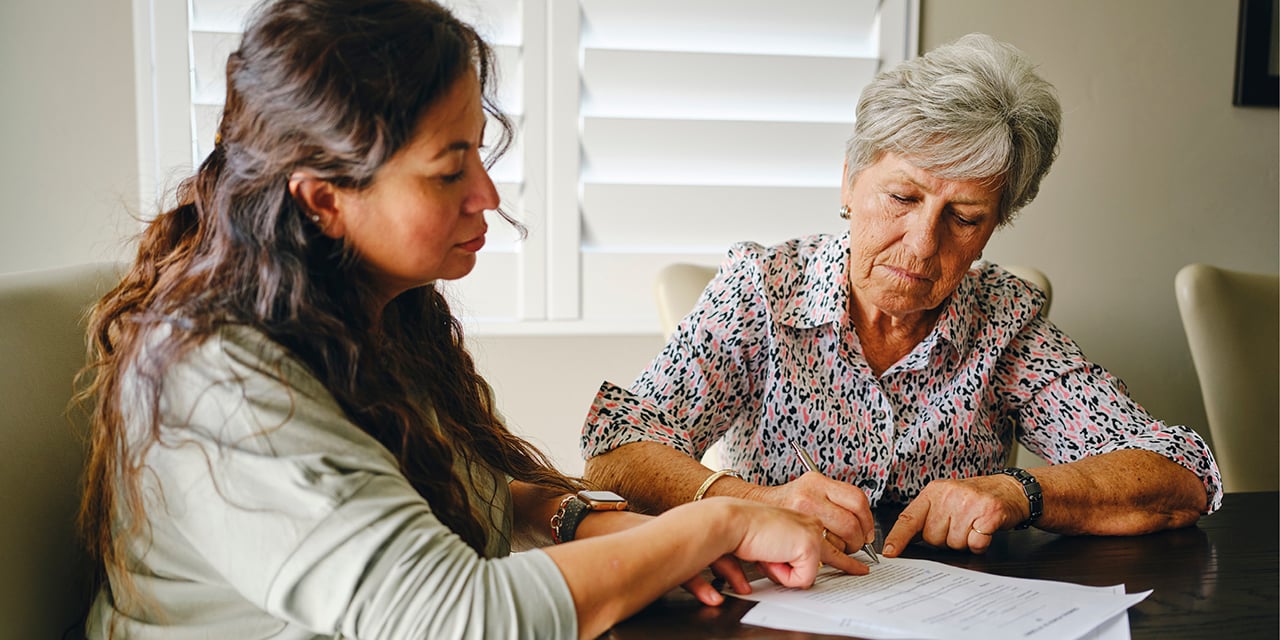
Protecting Loved Ones From Elder Financial Abuse
In 2024, Americans aged 60 and over lost $4.8 billion to internet scammers – a 33% increase in losses from 2023.1 For many, this age group includes loved ones, parents and grandparents who had once served as the protectors of their families. Now, as cybercriminals increasingly target older adults, the roles are shifting – placing the responsibility of protection on the next generation.
As older Americans continue to face the rapidly growing problem of elder fraud, how can you keep your loved ones safe? Here are the six things you can do to protect them from financial exploitation.
Be Aware of the Signs of Scams
Fraud schemes are constantly evolving with new technologies, which can make it challenging to stay up to date on the different types – criminals use the phone, call centers, email, internet pop-ups and even fake social media accounts to contact their victims. Fortunately, many scams share common characteristics that can help you spot a potential scheme before it’s too late:
- Creating a false sense of emergency: In many cases, scammers will pressure their victims to act quickly. They may pose as a loved one in distress or a member of law enforcement, demanding personal information or money to resolve an “emergency.” Their goal is to make you act before you have time to think critically.
- What you can do: Pause and take a moment to dial the person or organization’s verified phone number by hand. Scammers can make it look like they’re calling, texting or emailing from a real address – but by contacting the organization or person directly, you can weed out whether you’re being scammed or not.
- Exploiting trust: Sometimes, scams are more calculated – and the scammer will take time to develop a relationship with their victim before asking for money or information. In romance scams, for example, scammers create fictitious online dating profiles to build trust and later solicit money or personal details.
- What you can do: It’s always a good rule of thumb not to send personal information to another person via the internet or a text message – and it’s also smart to avoid sending money to anyone you haven’t met in-person. While these scammers will often offer and make plans to meet their victims in real life, it almost never actually happens.
- Triggering emotional responses. Scammers rely on fear and guilt often to elicit a response from their victims – but not always. They also appeal to hope and excitement. For example, scammers may impersonate lottery representatives claiming you’ve won a prize, and instruct you to pay for supposed shipping, taxes or other fees to claim your winnings.
- What you can do: If anyone contacts you regarding a prize you’ve won, do your due diligence – and err on the side of skepticism. Asking you to come in to collect your prize in-person is one thing, but demanding you send money to receive a prize is a clear sign of a scam. Again, if the scammer claims to come from a particular organization, look up the organization’s verified phone number and call back yourself. And if you’re ever directed to click on a link to pay or give out personal information, do not click it.
As you and your loved one work to determine whether you’re putting your information and money in a safe place, remember the Federal Trade Commission is also a trusted resource for identifying, reporting and eluding scams.
Start a Conversation
The best way to bring awareness to a subject is by talking about it, and that’s certainly the case when it comes to protecting and educating your elders on scams. If your loved one tends to be more private about their life, or is not typically receptive to advice, consider other entry points into the conversation. For example, try a casual introduction like, “Have you heard about the latest scam? I saw this on the news the other day…” As the conversation progresses, remind your loved one of best practices when it comes to looking out for scams – like not replying to any requests for Social Security or credit card numbers or avoiding product and investment pitches they didn’t request.
If you’d feel more comfortable having an extra set of eyes on your loved one’s finances, consider using a conversation tactic that makes the precaution a two-way street, like “Would you mind if we served as each others’ trusted contact if there are concerns about suspicious activity on our accounts?” This can, in turn, begin a healthy conversation regarding your loved one’s boundaries when it comes to sharing their financial information – so you can get a baseline for how involved they’d like you to be in monitoring their finances.
Watch for Changes in Financial Behavior
There are a few warning signs to look out for when it comes to your elderly loved one’s financial behavior – and while some of them may point to them being a victim of fraud, others may be related to natural cognitive decline. If you’re noticing either one, it’s important to take action so you can continue to protect them.
Warning signs that your loved one may be being scammed include unexplained money withdrawals, a sudden change in their financial situation, missing belongings, changes in their will or power of attorney documents and even suspicious signatures on checks or documents. If you notice any of these occurring, it may be time to do some digging into what’s really going on.
If you see your loved one becoming confused about which bills have been paid, changing their spending habits drastically, writing bounced checks or receiving late payment charges, they may be demonstrating memory and decision-making challenges that are consistent with cognitive decline – which leaves them much more vulnerable to scam artists. At this point, consider whether playing a larger part in their financial management could help keep them safe.
Help Simplify Their Finances
The more financial accounts you have, the higher your exposure is. If your loved one has accounts unnecessarily at more than one financial institution, or has credit cards they no longer use, ask them if they’d be okay with consolidating the accounts and getting rid of the unused credit cards. Along with that, check to see if your elder is manually paying their bills – and if they are, ask if they’re comfortable with setting up automatic bill pay. This way, you can reduce their exposure to fake invoices and prevent scams that claim they have a late payment on an important bill.
Go Over Key Financial Documents
Having access to – and going over the contents of – your loved one’s financial documents, like bank accounts and income statements, can significantly help you protect them from scams. For example, by ensuring they have a financial power of attorney, you secure someone to step in and manage your loved one’s finances if needed. This includes freezing accounts, reporting fraud or even reversing transactions. Plus, by giving yourself (or someone else they trust) access to their other financial documents and accounts, you can regularly monitor for unusual transactions or changes in beneficiaries, help fix a data breach or even intervene before any irreversible action is taken.
As you and your loved one review their trusted contact and beneficiary designations for each of their accounts, ask their financial institutions and relationship managers about the correct steps to take if you suspect someone is taking advantage of them. Consider focusing on protections for the following documents:
- Financial and healthcare power of attorney documents
- Insurance policies
- Investment accounts
- Bank accounts
- Income statements
- Retirement accounts
- Outstanding loan documents
- Current bills
- Deeds
- Will and living will
Services that track suspicious activity on bank accounts, investments and credit cards can also be a good complement to your personal monitoring. Some of these services, like ID Watchdog, are offered at Baird – and your Financial Advisor can help you determine whether these are the right choice for you and your family.
Assign Money Management Roles
Especially if you’ve noticed potential cognitive decline in your loved one, you may want to take on a more active role in protecting them from fraud – which can be overwhelming to do on your own. And while it’s important to limit the number of people who have access to their financial information, dividing money management tasks among trusted loved ones can be advantageous for everyone involved. For example, a family member who lives close by to the elder could monitor credit card accounts, bill paying and credit reports. Then, another family member could check bank account and debit card use periodically, while a trusted friend handles investment accounts. Along with this, be sure someone close to the elder has a list of who the senior’s key contact people are, like their Financial Advisor, lawyer or accountant to contact in the case of an emergency.
The thought of your elderly loved one being taken advantage of can be scary – but by partnering with them and your Financial Advisors, you can put precautions in place that put them at a much lower risk. Protecting seniors from fraud is a team effort, and if you have any questions or are looking for more information on how you can keep your loved one safe, reach out to your Baird Financial Advisor.
This information has been developed by a member of Baird Wealth Solutions Group, a team of wealth management specialists who provide support to Baird Financial Advisor teams. The information offered is provided to you for informational purposes only. Robert W. Baird & Co. Incorporated is not a legal or tax services provider and you are strongly encouraged to seek the advice of the appropriate professional advisors before taking any action. The information reflected on this page are Baird expert opinions today and are subject to change. The information provided here has not taken into consideration the investment goals or needs of any specific investor and investors should not make any investment decisions based solely on this information. Past performance is not a guarantee of future results. All investments have some level of risk, and investors have different time horizons, goals and risk tolerances, so speak to your Baird Financial Advisor before taking action.


